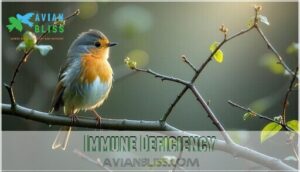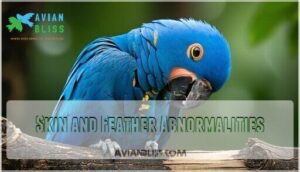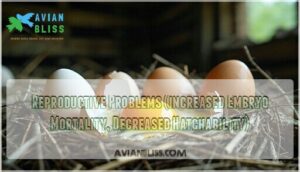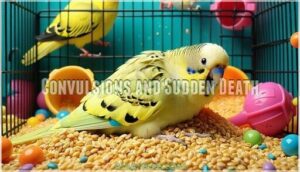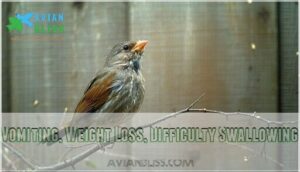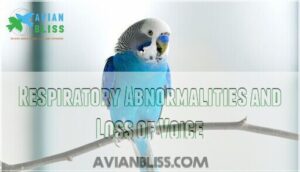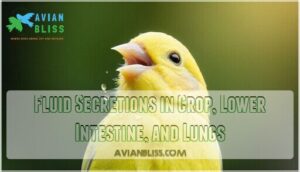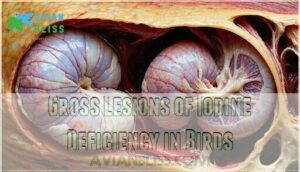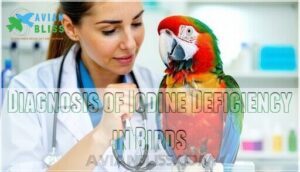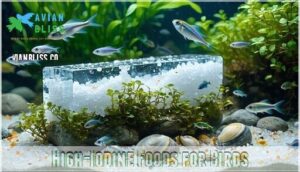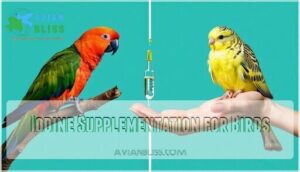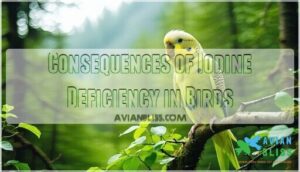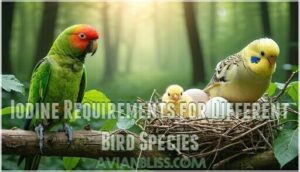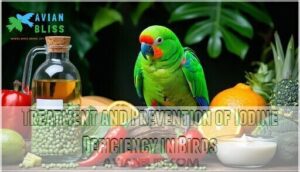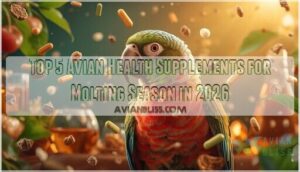This site is supported by our readers. We may earn a commission, at no cost to you, if you purchase through links.
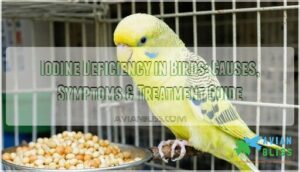
You’ll notice symptoms like lethargy, poor feather quality, breathing problems, and reproductive issues.
The thyroid gland swells, creating a goiter that presses against the trachea and esophagus.
This causes vomiting, weight loss, difficulty swallowing, and even voice changes.
Young birds face higher mortality rates, while adults become more susceptible to cold weather.
Adding iodine-rich foods like seafood, seaweed, or iodized salt helps, but avoid goitrogenic foods like kale that block iodine absorption.
The condition’s surprisingly common yet easily preventable with proper nutrition.
Table Of Contents
- Key Takeaways
- Causes of Iodine Deficiency in Birds
- Symptoms of Iodine Deficiency in Birds
- Enlarged Thyroid Glands (Goiter) in Birds
- Gross Lesions of Iodine Deficiency in Birds
- Diagnosis of Iodine Deficiency in Birds
- High-Iodine Foods for Birds
- Iodine Supplementation for Birds
- Consequences of Iodine Deficiency in Birds
- Iodine Requirements for Different Bird Species
- Treatment and Prevention of Iodine Deficiency in Birds
- Frequently Asked Questions (FAQs)
- Can birds get iodine deficiency?
- Do parrots have iodine deficiency?
- Does iodine deficiency affect avian health?
- Do birds need iodine supplementation?
- How do you treat iodine deficiency in birds?
- Can a bird eat Lugol iodine?
- What are the symptoms of iodine deficiency in birds?
- What foods are high in iodine for birds?
- What are the symptoms of iodine deficiency?
- What are the symptoms of hypocalcemia in birds?
- Conclusion
Key Takeaways
- Diet causes most deficiency cases – You are likely dealing with iodine deficiency if you are feeding your bird an all-seed diet, as seeds typically lack adequate iodine levels, especially from iodine-poor soil.
- Watch for breathing and neck swelling – You will notice your bird struggling to breathe with wheezing sounds, visible neck lumps from enlarged thyroid glands, and difficulty swallowing or eating.
- Add iodine-rich foods immediately – You can treat deficiency by providing seafood, seaweed, kelp, or iodized salt, while avoiding goitrogenic foods like kale and soybeans that block iodine absorption.
- Breeding birds need extra attention – You will see higher embryo mortality and weaker chicks if breeding birds do not get adequate iodine supplementation during reproduction periods.
Causes of Iodine Deficiency in Birds
Understanding what causes iodine deficiency in your birds is the first step toward preventing serious health complications.
You’ll encounter several key factors that can lead to this condition, ranging from inadequate diet to environmental toxins that interfere with your bird’s ability to process iodine properly, which is crucial for preventing serious health complications.
Insufficient Iodine Intake From Diet
Insufficient iodine intake stems from poor dietary choices that leave your bird’s system starved of this essential mineral.
Seed-based diets typically lack adequate iodine, especially when seeds come from soil with low iodine levels.
Most seeds from iodine-poor soil leave birds nutritionally starved of this essential mineral.
Your bird’s avian diet needs proper dietary iodine sources through balanced bird nutrition or targeted supplementation strategies to prevent iodine deficiency in birds.
Goitrogenic Agents in Feed (e.g., Soybean, Kale)
Beyond inadequate dietary iodine, goitrogenic agents in feed pose another threat to your bird’s thyroid health.
Soybeans, kale, and cruciferous vegetables contain compounds that block iodine uptake, triggering avian goiter even when iodine levels seem adequate.
These goitrogenic agents interfere with thyroid hormone production through specific goitrogen mechanisms.
Feed processing reduces some goitrogenic effects, but raw soybeans remain particularly problematic.
Consider alternative feeds if your bird shows sensitivity, as breed sensitivity varies substantially among species.
Iodine toxicosis in foals demonstrates that excessive iodine can also induce goiter.
Septicemic Diseases
Septicemic diseases create a domino effect in your bird’s system.
These systemic infections don’t just attack one area—they disrupt iodine metabolism throughout the body, potentially triggering thyroid dysfunction and worsening existing iodine deficiency in birds.
Disease Mechanisms affecting iodine metabolism include:
- Bacterial Infections that interfere with nutrient absorption and thyroid hormone production
- Viral Impact on cellular metabolism, reducing iodine utilization efficiency
- Fungal Infections creating inflammatory responses that disrupt normal thyroid function
- Immune Response overactivation, diverting resources from proper iodine processing
These avian medicine concerns require immediate veterinary care to prevent compounding thyroid problems.
Organophosphate or Chlorinated Biphenol Toxicity
Chemical toxins pose significant threats to bird health through complex toxicity mechanisms.
Organophosphate toxicity disrupts acetylcholinesterase enzyme inhibition, while chlorinated biphenol toxicity interferes with iodine absorption.
These environmental contaminants create cascading neurological effects that compromise avian medicine protocols.
- Organophosphates block hormone production pathways
- Chlorinated biphenyls prevent proper iodine uptake
- Both toxins weaken immune system defenses
- Effective detoxification strategies require immediate veterinary intervention
Symptoms of Iodine Deficiency in Birds
When you notice iodine deficiency in your bird, you’ll see several key warning signs that signal thyroid dysfunction.
These symptoms range from visible physical changes to behavioral shifts that can seriously impact your bird’s health and quality of life, signaling a need to address the iodine deficiency.
Immune Deficiency
Iodine deficiency creates a weak immune system that can’t fight off threats properly.
Your bird becomes vulnerable to secondary infections, shows poor vaccine response, and experiences compromised gut health.
Stress impact worsens these issues, leading to higher mortality rates.
The immune deficiency makes recovery from illnesses slower and more difficult.
Depression and Lethargy
Recognizing depression and lethargy in iodine-deficient birds requires understanding how thyroid dysfunction affects behavior.
When iodine deficiency disrupts thyroid function, you’ll observe significant behavioral changes that impact your bird’s quality of life.
Here are five key behavioral indicators to monitor:
- Energy Levels – Your bird becomes sluggish and inactive throughout the day
- Appetite Changes – Reduced interest in food and treats they previously enjoyed
- Social Interaction – Withdrawal from human contact and other birds
- Sleep Patterns – Excessive sleeping or difficulty maintaining normal rest cycles
- Vocalization Changes – Decreased singing, calling, or chirping frequency
These symptoms stem from inadequate thyroid hormone production, which regulates metabolism and energy distribution in birds with iodine deficiency.
Skin and Feather Abnormalities
Beyond lethargy, you’ll spot visible changes in your bird’s appearance. Iodine deficiency disrupts normal feather development and skin health through thyroid dysfunction.
Watch for these telltale signs:
- Feather Loss: Patches of missing feathers, especially around the neck area
- Plumage Quality: Dull, brittle plumage that lacks natural shine and vibrancy
- Molting Issues: Delayed or incomplete molting cycles affecting seasonal feather replacement
- Skin Dryness: Flaky, irritated skin beneath feathers becomes increasingly noticeable
- Color Changes: Feathers appear faded or develop unusual discoloration patterns
These abnormalities signal your bird’s body can’t properly maintain its protective feather coat.
Reproductive Problems (increased Embryo Mortality, Decreased Hatchability)
Your breeding program takes a serious hit when iodine deficiency strikes.
You’ll notice dropping fertility rates and poor egg viability as thyroid dysfunction disrupts hormonal balance.
Embryo mortality spikes during development, while hatching success plummets.
Chick development suffers markedly, creating weak hatchlings with compromised immune systems.
This breeding impact extends beyond immediate losses, affecting your flock’s long-term reproductive capacity and egg production quality, leading to a significant issue with thyroid dysfunction.
Enlarged Thyroid Glands (Goiter) in Birds
When your bird’s thyroid gland enlarges due to iodine deficiency, it creates a visible goiter that can seriously compromise their health.
This swelling puts pressure on surrounding structures, leading to breathing difficulties and potentially life-threatening complications if left untreated.
Convulsions and Sudden Death
When enlarged thyroid glands press against surrounding structures, they can trigger convulsions and sudden death in birds.
These neurological abnormalities result from organ failure and respiratory arrest caused by severe compression.
The electrolyte imbalance from thyroid dysfunction worsens neurological damage.
Some birds with genetic predisposition face higher risks of these fatal complications from iodine deficiency.
A common issue is enlargement of the thyroid particularly in budgerigars.
Vomiting, Weight Loss, Difficulty Swallowing
When your bird’s enlarged thyroid gland (goiter) presses against surrounding structures, you’ll see vomiting, weight loss, and difficulty swallowing.
These regurgitation causes stem from disrupted swallowing mechanics as the mass compresses the esophagus.
The weight loss impact worsens with dietary changes and creates aspiration risks.
These iodine deficiency in birds symptoms require immediate attention to prevent further complications.
Respiratory Abnormalities and Loss of Voice
As iodine deficiency worsens, your bird’s breathing becomes strained and voice changes noticeably.
The enlarged thyroid gland compresses airways, creating respiratory distress that manifests in several ways:
- Breathing Difficulty – Labored, harsh breathing patterns develop
- Voice Changes – Normal vocalizations become weak or absent
- Airway Compression – Swollen thyroid presses against trachea
- Wheezing Sounds – Audible respiratory strain during breathing
- Clicking Noises – Distinctive sounds from airway obstruction
These respiratory abnormalities indicate serious goiter progression requiring immediate veterinary attention.
Fluid Secretions in Crop, Lower Intestine, and Lungs
Beyond breathing problems, fluid secretions build up in your bird’s crop, lower intestine, and lungs when goiter worsens.
This fluid imbalance creates dangerous swelling that compounds respiratory abnormalities from iodine deficiency.
Crop secretions and intestinal fluids indicate severe goiter symptoms requiring immediate avian veterinary care.
Lung fluids can quickly become life-threatening without proper secretion analysis and treatment.
Gross Lesions of Iodine Deficiency in Birds
When you examine birds with iodine deficiency, you’ll notice specific physical changes in their thyroid glands that help confirm the diagnosis.
These gross lesions provide clear visual evidence of the condition’s impact on the bird’s thyroid tissue and surrounding structures.
Enlarged, Brownish Glands
During necropsy, you’ll observe dramatically enlarged thyroid glands that showcase distinct brownish discoloration.
These glands expand from their normal 3mm size to over 1cm, creating visible neck swelling that compresses surrounding tissues.
Key goiter appearance features include:
- Glandular discoloration – Normal pink tissue turns distinctly brown
- Tissue compression – Enlarged glands press against trachea and esophagus
- Microscopic changes – Hyperplastic tissue shows functional impact on hormone production
Yellow Granules
When inspecting thyroid tissue during necropsy, you’ll discover yellow granules scattered throughout the hyperplastic gland.
These granules serve as gross indicators of chronic iodine deficiency in birds, with their composition reflecting impaired thyroxine synthesis.
The granule formation occurs as thyroid cells struggle with hormone production, making their location and significance essential for diagnosing bird diseases related to iodine deficiency.
Fluid-containing Cysts
In chronic iodine deficiency cases, you’ll discover large, fluid-filled cysts developing within the enlarged thyroid tissue.
These cysts represent advanced pathological changes that worsen your bird’s condition beyond simple gland enlargement.
Here’s what you need to know about cyst formation:
- Cyst Formation occurs when longstanding iodine deficiency causes tissue degeneration
- Cyst Location appears inside hyperplastic thyroid glands at the neck base
- Cyst Size varies but correlates with deficiency severity and duration
- Cyst Complications include increased pressure on airways and swallowing structures
- Cyst Removal requires veterinary intervention as dietary correction alone won’t eliminate them
These fluid-containing cysts differentiate simple thyroid enlargement from complex goiter pathology, making early iodine supplementation critical for preventing irreversible damage.
Neck Swelling
You’ll observe visible neck swelling when your bird’s thyroid gland enlarges due to iodine deficiency.
This goiter creates a noticeable lump near the throat, causing breathing difficulty and swallowing issues.
The thyroid enlargement compresses surrounding structures, making your bird hold its head upright to breathe easier.
In some cases, neck twisting can also occur, though heavy metal toxicity is another potential cause, related to breathing difficulty and neck twisting.
Diagnosis of Iodine Deficiency in Birds
Identifying iodine deficiency in birds requires a systematic approach combining clinical observation with diagnostic testing.
Your veterinarian will examine your bird’s history, symptoms, and diet while performing physical tests and blood work to confirm the diagnosis.
History, Clinical Signs, Diet
When diagnosing iodine deficiency, your bird’s history reveals key clues about dietary deficiencies and bird symptoms.
Historical Prevalence shows seed-only diets create risks, while Breed Predisposition affects certain species more.
Early Symptoms emerge gradually through behavioral changes.
- Dietary Impact: All-seed diets lacking iodine supplementation
- Seed Origins: Birds from low-iodine soil regions show higher deficiency rates
- Clinical signs: Lethargy, voice changes, breathing difficulties, poor feather quality
- Behavioral changes: Reduced singing, stress intolerance, head positioning for easier breathing
- Reproductive history: Decreased fertility, embryo mortality, weak offspring development
Physical Examination (palpation)
During your physical examination, you’ll gently palpate the ventral neck area to detect thyroid enlargement.
Feel for firm masses near the trachea that indicate goiter formation.
Listen for respiratory sounds like wheezing or clicking that suggest tracheal compression from enlarged thyroid glands.
| Examination Area | Normal Finding | Abnormal Finding |
|---|---|---|
| Thyroid Palpation | Smooth, small glands | Firm, enlarged mass |
| Neck Swelling | No visible bulge | Noticeable lump present |
| Breathing Sounds | Quiet, normal | Wheezing, clicking sounds |
Blood Thyroxine Levels
Blood testing reveals critical thyroid function data through T4 measurement and thyroxine levels. Normal ranges span 5-15 ng/mL for T4, while deficiency thresholds indicate iodine deficiency in birds.
Your veterinarian will assess diagnostic accuracy and supplement impact on thyroid hormones.
Here’s what blood testing reveals:
- T4 levels drop below 5 ng/mL in deficient birds
- Normal ranges help distinguish healthy from affected birds
- Deficiency thresholds guide treatment decisions
- Supplement impact monitoring tracks recovery progress
- Diagnostic accuracy improves with proper blood work timing
Necropsy and Microscopic Examination
Sometimes, a necropsy and microscopic examination are your best tools for uncovering the root of iodine deficiency in birds.
You’ll find more than just a swollen neck. Look for:
- Enlarged brownish glands (goiter analysis)
- Fluid-containing cysts and gross lesions
- Cellular changes in thyroid histopathology
- Fungal or bacterial presence complicating recovery.
Lesion identification is key to proper diagnosis. Noticing behavioral changes can also provide clues for early diagnosis of bird diseases, which is crucial for effective treatment and recovery.
High-Iodine Foods for Birds
When you’re dealing with iodine deficiency in your bird, certain foods can help restore healthy thyroid function quickly.
Seafood, seaweed, iodized salt, and fortified bird feeds provide the essential iodine your feathered friend needs to prevent goiter and maintain proper metabolism.
Seafood
Shrimp, fish, and eggs pack serious iodine punch for your bird’s thyroid health.
These marine-based foods deliver natural iodine that’s easily absorbed. Start with cooked shrimp or flaked fish twice weekly.
Seafood preparation matters—avoid seasoning and remove bones. Check for seafood allergies first.
Consider specialized options designed for avian diets. Sustainable seafood choices support both your bird’s nutrition and ocean health while addressing iodine deficiency effectively, making them a good choice for thyroid health and overall avian diets.
Seaweed
Kelp and other seaweed types deliver concentrated iodine that supports your bird’s thyroid function.
These natural seaweed supplements contain essential minerals and vitamins, improving feather quality in species like Gouldian finches.
Mix kelp granules into soft foods or sprinkle over vegetables. You can easily find a seaweed supplement for birds online.
Remember, seaweed benefits come with risks—excessive intake causes iodine toxicity, so moderation matters for ideal avian health.
Iodized Salt
Several iodized salt options can boost your bird’s iodine intake safely.
Use table salt containing potassium iodide or sodium iodide—both provide essential iodine supplementation.
Mix tiny amounts into water or sprinkle over food.
Avoid salt substitutes lacking iodine content.
Monitor salt dosage carefully, as excess causes toxicity.
These salt forms offer convenient iodine sources when commercial feeds fall short.
To determine appropriate salt quantities, consult product guidelines.
Fortified Bird Feed
While iodized salt offers one option, fortified bird feed provides a more balanced approach to preventing iodine deficiency. Commercial bird feeds now include carefully measured iodine levels, ensuring proper avian nutrition without guesswork.
These feeds offer superior iodine bioavailability compared to basic seed mixes. Quality fortified feeds feature:
- Pelleted diets with kelp-derived iodine for natural absorption
- Extruded feeds combining multiple iodine sources for consistency
- Enriched seed blends fortified during feed formulation processes
Commercial availability has expanded substantially, though cost analysis shows premium feeds cost more upfront. Follow storage guidelines to maintain iodine potency. Always verify iodine content on labels when selecting iodine supplementation products for your birds.
Iodine Supplementation for Birds
When your bird shows signs of iodine deficiency, proper supplementation becomes essential for restoring thyroid function and preventing serious health complications.
You’ll need to work with an avian veterinarian to determine the right supplementation approach, whether through Lugol’s iodine drops in water or specialized dietary changes.
Importance for Fetal Growth and Development
Beyond providing rich iodine sources, you’re setting up developing embryos for success.
Adequate iodine intake supports thyroid hormone synthesis that’s essential for chick development and improved hatchability rates.
When breeding birds receive proper iodine supplementation, their fetal thyroid functions perfectly, reducing embryo mortality and boosting newborn health outcomes substantially.
| Development Stage | Iodine Impact | Without Adequate Iodine |
|---|---|---|
| Embryonic Growth | Normal thyroid hormone production | Stunted development, poor organ formation |
| Hatchability | Strong, viable chicks emerge | Increased dead-in-shell eggs, weak hatchlings |
| Newborn Health | Robust immune system, proper metabolism | Higher mortality rates, respiratory distress |
| Long-term Survival | Healthy growth patterns established | Developmental delays, increased disease susceptibility |
Critical for Newborn Survival
Newborn survival depends on adequate iodine levels during critical early development stages.
Critical iodine intake during development determines chick survival rates.
Your chicks face substantially higher mortality rates without proper maternal iodine supplementation, which can reduce death rates by up to 72%.
- Chick Development: Iodine deficiency causes respiratory distress and developmental delays in hatchlings
- Hatchability Rates: Breeding birds with adequate iodine show improved egg success and stronger offspring
- Immune System: Proper supplementation timing strengthens newborn resistance to disease and environmental stress
Drenching With Potassium Iodide
When newborn survival depends on proper care, potassium iodide drenching offers targeted treatment for iodine deficiency in birds.
You’ll mix a 4% solution—two drops per liter of water—and provide it as their sole water source.
| Dosage Calculation | Administration Technique | Monitoring Progress |
|---|---|---|
| 4% solution strength | Sole water source daily | Check breathing patterns |
| 2 drops per liter | Replace every 24 hours | Watch for neck swelling |
| Repeat every 2-3 weeks | Clean water containers | Monitor eating habits |
| Adjust for bird size | Observe consumption levels | Track energy levels |
| Consult vet for dosage | Make fresh preparation | Note feather quality |
This method prevents toxicity concerns while addressing iodine deficiency in birds effectively.
Long-term effects improve when you maintain consistent iodine supplementation schedules.
Iodine Supplementation for Pregnant Birds
Pregnancy amplifies your bird’s iodine requirements dramatically.
Supplement timing matters—start before egg laying for ideal fetal development. Calculate dosage carefully: 200 µg daily supports egg quality and chick health.
Monitor closely since excessive iodine supplementation can harm embryos. Essential nutrients for birds are especially critical during this time.
Balance is key for newborn survival and healthy reproductive outcomes.
Consequences of Iodine Deficiency in Birds
When your bird’s thyroid can’t produce enough hormones due to iodine deficiency, serious health problems quickly follow.
You’ll notice your feathered friend struggling with breathing difficulties, weakened immunity, and potentially life-threatening complications that demand immediate attention.
Lack of Thyroid Hormone Production
While supplementation matters, lack of thyroid hormone production creates serious problems for your bird’s health.
When iodine deficiency disrupts thyroid function, hypothyroidism develops, causing widespread metabolic slowdown throughout your bird’s body systems.
- Metabolic Slowdown – Your bird’s entire system operates at reduced capacity, affecting digestion and energy processing
- Energy Depletion – Chronic fatigue and weakness become noticeable as cellular energy production drops substantially
- Feather Quality deteriorates with brittle, dull plumage that breaks easily and molts irregularly
- Cold Sensitivity increases as your bird struggles to regulate body temperature without adequate thyroid hormones
- Chick Mortality rises when breeding birds can’t support proper embryonic development through hormone deficiency
Enlarged Thyroid Gland (goiter)
When iodine deficiency strikes, your bird’s thyroid gland compensates by growing larger, creating a visible goiter.
This enlarged thyroid gland appears as neck swelling and causes breathing difficulty as it presses against airways.
You’ll notice swallowing issues and voice changes in affected birds.
Goiter complications include respiratory distress and feeding problems, making prompt treatment essential for restoring normal thyroid function.
Swelling in Throat Area
Throughout your bird’s neck area, the enlarged thyroid gland creates visible swelling that’s hard to miss.
This goiter complications directly impact your pet’s comfort and health.
Watch for these key signs:
- Visible Lump – Noticeable bulge at the base of the throat
- Breathing Difficulty – Labored, harsh breathing sounds from neck compression
- Swallowing Issues – Trouble eating or drinking normally
- Hoarse Vocalizations – Changes in your bird’s voice quality
Susceptibility to Cold, Wet Weather
When thyroid function drops, your birds become sitting ducks for harsh weather.
Poor feather quality means lousy insulation, while weakened immune response leaves them vulnerable.
Thermoregulation issues force higher energy expenditure just to stay warm.
Behavioral adaptations like huddling increase, but iodine deficiency in birds makes survival tough when temperatures drop or rain soaks their compromised plumage, leading to significant thermoregulation issues.
High Mortality Rates in Newborns
Devastating losses strike when iodine deficiency compromises fetal growth and newborn survival in birds.
Weak chicks struggle from the moment they hatch, facing overwhelming challenges their fragile systems can’t overcome.
- Compromised chick development results in underdeveloped offspring with poor hatching success rates
- Severe immune vulnerability leaves newborns defenseless against common infections and diseases
- Critical supplementation timing during reproduction directly impacts hatchability and reproductive issues prevention
Iodine Requirements for Different Bird Species
Different bird species require varying amounts of iodine to maintain healthy thyroid function and prevent goiter formation.
You’ll need to pay special attention to pregnant birds, as they require increased iodine intake to support proper fetal development and prevent newborn mortality.
Varying Requirements Based on Species
Bird Species Needs vary dramatically – small songbirds require different Supplementation Levels than large parrots.
Metabolic Rates influence Iodine Absorption, while Dietary Differences between seed-eating and nectar-feeding birds affect iodine requirements.
Your budgie’s needs differ from your cockatiel’s. Species-specific iodine requirements guarantee proper thyroid function, making species-appropriate diet planning imperative for preventing iodine deficiency in birds.
Importance of Adequate Intake During Pregnancy
During pregnancy, proper iodine intake becomes critical for successful breeding pairs.
Adequate levels support fetal development and prevent reproductive issues that lead to embryo mortality.
- Fetal Development: Supports proper thyroid function in developing embryos
- Chick Health: Supports strong immune systems and healthy growth patterns
- Egg Quality: Improves shell strength and nutrient content for better outcomes
- Breeding Success: Reduces hatchability problems and increases viable offspring
- Iodine Supplementation: Prevents iodine deficiency during this vital reproductive period
Potential Risks of Excessive Supplementation
Over-supplementation creates toxicity symptoms and organ damage in birds.
You’ll need dosage monitoring to prevent mineral imbalance from iodine supplements. Overdosing disrupts thyroid function worse than deficiency itself.
Close monitoring prevents potential risks of excessive supplementation. A balanced bird diet can prevent deficiencies.
Always seek veterinary oversight when adding iodine supplementation to avoid dangerous levels.
Treatment and Prevention of Iodine Deficiency in Birds
You can effectively treat and prevent iodine deficiency in your birds through proper diet and supplementation.
Working with an avian veterinarian guarantees you’ll get the right treatment plan customized to your bird’s specific needs, ensuring a proper diet.
Providing Iodine-rich Foods
Nutritional powerhouse foods can transform your bird’s health when dealing with iodine deficiency.
Focus on these dietary diversity options that naturally boost iodine levels and support thyroid function.
- Kelp Benefits – Add dried kelp flakes to regular feed for concentrated iodine supplementation for birds
- Seed Enrichment – Mix iodine-fortified seeds into existing diet for gradual improvement
- Mineral Blocks – Provide iodine-enriched mineral blocks for self-regulated intake
- Water Additives – Use kelp-based liquid supplements in drinking water for consistent dosing
Using Iodized Salt
When choosing iodized salt for your feathered friends, remember that less is more.
A light sprinkle on their regular food provides essential iodine without overwhelming their delicate systems.
Monitor salt dosage carefully—too much can cause dehydration and kidney stress.
Standard table salt works fine, but avoid flavored varieties.
Consider water salting by dissolving tiny amounts in drinking water for consistent iodine intake and safe usage.
Avoiding Goitrogenic Agents in Feed
Several goitrogenic agents interfere with iodine uptake and thyroid function in birds. These compounds can worsen iodine deficiency even when dietary iodine levels seem adequate.
Common goitrogen sources include:
- Soybeans and soy-based feeds
- Kale and other cruciferous vegetables
- Cabbage family plants
- Broccoli and cauliflower
Cooking effects reduce goitrogenic activity, making these foods safer. Choose safe alternatives or limit these ingredients in feed formulation to protect your bird’s thyroid health.
Consulting With an Avian Veterinarian for Proper Supplementation
Your avian veterinarian provides expert veterinary guidance for safe iodine supplementation.
They’ll determine proper dosage accuracy based on your bird’s specific needs and create long-term plans for treatment.
Regular check-ups guarantee effective monitoring progress while exploring alternative options if needed.
Professional supplementation benefits include preventing dangerous over-dosing and customized iodine supplements for birds.
Frequently Asked Questions (FAQs)
Can birds get iodine deficiency?
Like a silent thief stealing energy, iodine deficiency strikes birds hard. You’ll notice enlarged thyroid glands causing breathing troubles, especially in seed-eating birds like budgerigars needing proper nutrition.
Do parrots have iodine deficiency?
Yes, parrots commonly develop iodine deficiency, especially those on all-seed diets. You’ll notice neck swelling, breathing difficulties, and poor feather quality. It’s particularly prevalent in budgerigars and requires veterinary treatment.
Does iodine deficiency affect avian health?
When your pet bird’s thyroid swells like a balloon, it’s signaling serious trouble.
Yes, iodine deficiency severely impacts avian health, causing breathing difficulties, goiter, reproductive problems, and weakened immunity that can prove fatal.
Do birds need iodine supplementation?
Birds on all-seed diets typically require iodine supplementation since seeds contain inadequate levels.
You’ll need to add iodine-rich foods, supplements, or fortified feeds to prevent thyroid problems and maintain proper health.
How do you treat iodine deficiency in birds?
Picture your feathered friend struggling to breathe with a swollen throat—that’s iodine deficiency‘s grip.
You’ll treat it with Lugol’s iodine (one drop per 250ml water), switch to iodine-rich foods, and consult your vet for proper dosing and monitoring.
Can a bird eat Lugol iodine?
No, birds shouldn’t eat Lugol’s iodine directly.
Instead, you’ll add one drop to 250ml of drinking water.
This diluted solution provides safe, effective treatment for thyroid issues without risking iodine toxicity from concentrated doses.
What are the symptoms of iodine deficiency in birds?
Like a warning bell going off, you’ll notice breathing difficulties with wheezing, clicking sounds, and visible neck swelling from an enlarged thyroid gland.
Your bird may struggle eating, show lethargy, and develop poor feather quality.
What foods are high in iodine for birds?
You’ll find excellent iodine sources in seafood, seaweed, kelp, and iodized salt.
Commercial fortified feeds often contain adequate iodine levels.
Avoid all-seed diets since they’re typically iodine-deficient and can lead to thyroid problems.
What are the symptoms of iodine deficiency?
You’ll notice a visible lump on your bird’s neck from an enlarged thyroid gland, plus harsh breathing, wheezing, clicking sounds, and difficulty swallowing or eating food.
What are the symptoms of hypocalcemia in birds?
Ironically, while you’re concerned about iodine deficiency, hypocalcemia presents different challenges.
You’ll notice muscle tremors, seizures, egg-binding in females, weak bones, and tetany.
These calcium-shortage symptoms affect muscle function and skeletal health dramatically.
Conclusion
Preventing iodine deficiency in birds requires commitment, knowledge, and consistent action.
You’ll protect your birds’ health by providing iodine-rich foods, avoiding goitrogenic substances, and monitoring their diet carefully.
Early detection makes treatment more effective, while proper nutrition prevents most cases entirely.
Don’t wait for symptoms to appear—start supplementing now, as your birds depend on you for their thyroid health, and addressing iodine deficiency in birds today guarantees they’ll thrive tomorrow with proper care and attention.
- https://nilesanimalhospital.com/files/2012/05/Iodine-Deficiency-Goiter-in-Birds.pdf
- https://www.goldencob.com.au/articles/iodine-your-bird/
- https://www.merckvetmanual.com/exotic-and-laboratory-animals/pet-birds/nutritional-diseases-of-pet-birds
- https://www.avianempire.co.nz/blogs/sams-blog/the-case-for-iodine-supplementation-for-birds-in-nz
- https://www.msdvetmanual.com/poultry/nutrition-and-management-poultry/mineral-deficiencies-in-poultry

